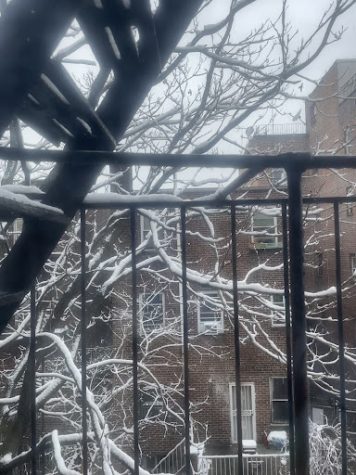On Solitude: Fire Escapes and Ellen Bass
During my aimless wanderings in the city, my eyes are inevitably drawn upwards, tracing the iron skeletons against laid brick. Fire escapes traverse the walls like kudzu on the varied blues, greens and browns of East 189th Street.
I could spend hours transfixed on those lines, peering between them to read hidden lives like sheet music. All that communion, conversation and connection, compartmentalized in the walls of each unit — and yet there the fire escape clings in its powerful rusted silence.
The first urban fire escape was invented by Englishman Daniel Maseres in 1784, specifically for personal use. The primary model was rather elementary: a rope, attached to a window, was anchored to the ground with a hefty wooden platform and used as a means of escape. With the arrival of the 21st century, traditional iron fire escapes began to appear on the side of residential buildings, diluting the personal fire escape to complete antiquation.

In my tendency to rhapsodize the mundane, fire escapes embody the honest vulnerability of being human. Black bars rich with meaning are simultaneously a tethered extremity. They are exiled from dinner tables, the circles of friends around couches, the shoe racks and warm carpets of apartments. Similar to these structures, it’s easy to feel othered by seclusion.
In college especially, there’s a need to be seen, to be heard. I once grappled with my own fire escape turmoil, attempting to understand the looming truth of purpose and place. I felt spurred to surround myself with people, to weave threads of others into myself. Yet it wasn’t until I fully embraced the importance of solitude that I fortified my own identity. I need not be a constantly centralized object.
When I moved from the suburbs of Georgia to New York, the prospect of urban roar was sweet to the tongue. At this point, I found occasional anonymity to be a source of comfort. It’s no wonder that a part of me feels so close to fire escapes — they allow me to gather the chaos and noise and purge it outside my window, crystallized into a structure so stoic as to be a direct product of solitude itself. Just like we need fire escapes, fire escapes need us. Solitude is not shameful, but introspective. It is soft and nurturing and absolutely necessary in a world that is constantly trying to talk over you.
Ellen Bass is one of my favorite queer contemporary poets, by virtue of her unabashed love for both pain and joy. When I read her prose, the graceful simplicity of her diction parallels the architectural modesty of the New York fire escape. In her poem, “The World Has Need of You,” she writes:
It’s a hard time to be human. We know too much
and too little. Does the breeze need us?
The cliffs? The gulls?
If you’ve managed to do one good thing,
the ocean doesn’t care.
But when Newton’s apple fell toward the earth,
the earth, ever so slightly, fell
toward the apple.
When I climb onto my own fire escape, the murmurs of other tenants shrouding me against the brisk of February, her words come alive in an inanimate echochamber. And its iron rungs bend, ever so slightly, toward me.
Ilaina Kim is a senior from Atlanta pursuing a major in English with a minor in philosophical studies. She joined The Fordham Ram as an Assistant Editor...










































































































































































































